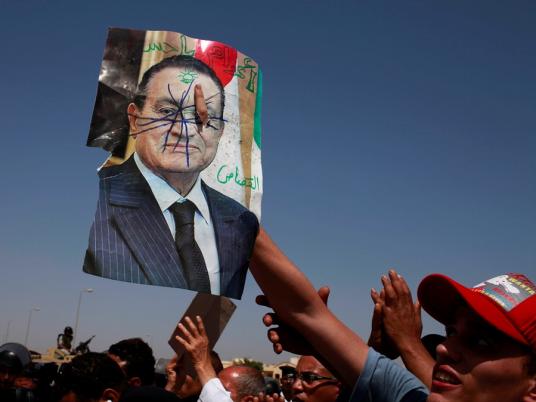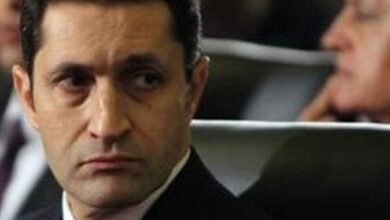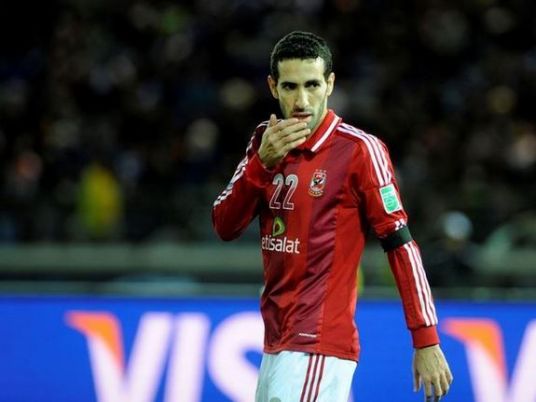
While supporters of former President Hosni Mubarak chanted “God is great” and “Long live justice” in the courtroom after the annulment of the life sentence verdict he received last summer, the front-page headline of the Freedom and Justice Party daily, the Brotherhood mouthpiece, read, “Death sentence awaits Mubarak.”
The case dubbed the “trial of the century” — many Egyptians had applauded the moment the country’s former president uttered, “Present, your honor,” in response to the presiding judge Ahmed Refaat’s call — came to a bitter end in June when the court ruled all defendants innocent, except Mubarak and his interior minister, Habib al-Adly.
The verdict came after an eloquent speech by Refaat scrutinizing the politics of the fallen regime, leading most analysts to believe the verdict fell on political considerations, rather than legal ones.
It was a success for Mubarak’s legal team, led by lawyer Farid al-Deeb. While Mubarak and Adly received 25-year sentences for failing to prevent the killing of protesters, the six Adly aides were cleared of all charges. Meanwhile, Mubarak, his two sons and businessman Hussein Salem were found innocent on charges of squandering public funds and engaging in an illegal gas export deal to Israel.
Last Sunday, the Court of Cassation accepted the prosecutor general’s appeal against the innocent verdicts for Mubarak; his two sons, Alaa and Gamal; businessman Hussein Salem; Adly; and his six assistants in the cases of gas exports to Israel, public funds squandering, and participation in the killing of protesters.
The court also accepted the appeal issued by Mubarak and Adly against the 25-year sentences they received for failing to prevent the killing of protesters. The court referred the entire case to the Court of Appeals to determine a new court to review the case.
The repercussions of these appeals remain unknown, with possible reversible outcomes for the different defendants in the case. While some legal experts argue no harsher sentences are expected against Mubarak and Adly, others argue the appeals return the whole case to square one with possibly completely different verdicts.
“The trial is back to square one, except that the defendants can’t receive more than a life sentence, since they were the ones who appealed the verdict. The legal principle says that the petitioner can’t be prejudiced by his own petition,” says Khaled Abu Bakr, member of the Union of Arab Lawyers and one of the civil rights lawyers in this case.
Judge Ali Shawky, head of Giza Criminal Court, agrees with Abu Bakr that Mubarak and Adly would not get a more severe verdict, based on the aforementioned principle. He emphasizes, however, that the verdict ruling Adly’s six assistants innocent could be overruled completely, with the possibility of receiving harsher verdicts up to a death sentence if the new court sees fit.
However, Nasser Amin, head of Arab Center for Independence of the Judiciary, disagrees with the idea that Mubarak and Adly may not get a harsher sentence following the appeal on their verdict. He argues that the principle saying the petitioner can’t be prejudiced by his own petition only applies to the appeal against the verdict issued by the first instance court before the second instance court.
However, the rulings of the criminal court that issued Mubarak and Adly’s verdicts can only be appealed through the Court of Cassation, which would either accept or decline the appeal, thus returning it to square one. This is because the Cassation Court only examines whether the law was applied correctly in a case, rather than issuing a verdict on the facts.
“As for the criminal court regarding Mubarak’s case, the verdict is final and can’t be appealed before the Court of Appeals, but when it’s appealed before the Court of Cassation — which is not a court of second instance — it either approves or refuses the verdict altogether,” Amin adds.
As such, he suggests that all options are on the table for the new investigating judge, from ruling Mubarak innocent to a death penalty.
Meanwhile, there are different legal arguments about the possibility of introducing new information to the case.
“The prosecution needs to file any new evidence, and the court will take it into consideration if suitable. The court will even look into any evidence filed by parties other than the prosecution, since it doesn’t make sense to let a defendant be punished if he can be proved innocent, and vice versa,” says Shawky.
Abu Bakr confirms that the investigating judge can look into any new information, and any party can file new evidence at any time. If the judge wishes to call new defendants or accusations in the case, the court will have to refer it to prosecution to reinvestigate the new accusations or defendants, referring it to a new judge to review it furthermore.
Amin disagrees.
“The Public Prosecution can’t file any new evidence unless the court orders them to reopen investigations, and this would mean that the case goes back beyond square one, as the prosecution will have to begin their investigations all over again,” he says.
If the appeal was again accepted by the Court of Cassation, it would be investigating this case and issuing a final verdict that cannot be reversed, because under Egyptian law, it may only consider a case twice — after which time it itself investigates the case and issues a final, unchallengeable verdict.
However, President Mohamed Morsy has challenged this legal principle in cases linked to the revolution.
Morsy’s 9 December declaration read, “If the investigations find new evidence related to the above-mentioned crimes, the Public Prosecution is to refer the case to a court of legal jurisdiction, even if there is a final acquittal in the case or if the court rejected the prosecutor general’s appeal on the acquittal.”
Moreover, the prosecutor general formed the new “Revolution Protection Prosecution” on 10 January to investigate the results reached by a fact-finding committee assigned by Morsy in July to look for new evidence implicating Mubarak and his assistants in the killing of protesters.
A member of the fact-finding committee, Mohsen al-Bahnasy, told media outlets that the committee has found new evidence proving Mubarak’s involvement in the killing of protesters, along with the former heads of the Interior Ministry and some figures from the dissolved National Democratic Party. Morsy reviewed the final report and forwarded it to the Public Prosecution to further investigate these results.
Although critical of this mechanism, Ahmed Ragheb, head of the Hisham Mubarak Law Center and member of the fact-finding committee, finds it useful.
“The Revolution Protection Prosecution is quite notorious, and there are valid fears that it will be used against activists and opposition, but its only advantage is that it can reinitiate trials even after final verdicts over cases related to the revolution are issued,” he says.
Ragheb says the Public Prosecution ought to reinvestigate the evidence and scrutinize information before initiating retrials, while the courts viewing the cases maintain their right to decide whether they will affect the course of the trials.
This article was translated from Arabic by Nadia Ahmed.
This piece was originally published in Egypt Independent's weekly print edition.




